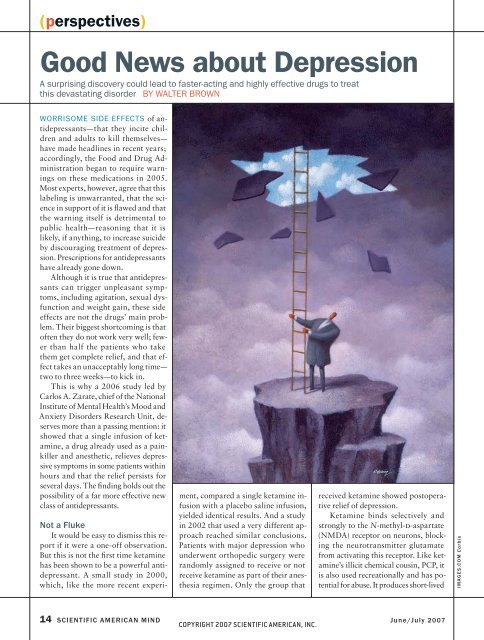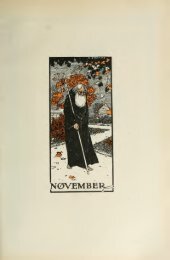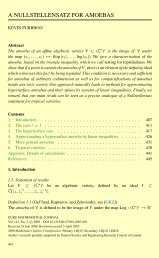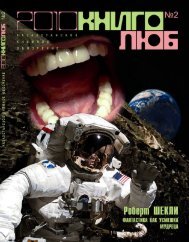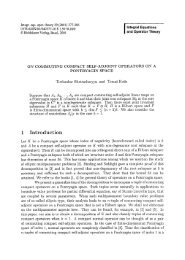Scientific American Mind-June/July 2007
Scientific American Mind-June/July 2007
Scientific American Mind-June/July 2007
You also want an ePaper? Increase the reach of your titles
YUMPU automatically turns print PDFs into web optimized ePapers that Google loves.
(perspectives)<br />
Good News about Depression<br />
A surprising discovery could lead to faster-acting and highly effective drugs to treat<br />
this devastating disorder BY WALTER BROWN<br />
WORRISOME SIDE EFFECTS of antidepressants—that<br />
they incite children<br />
and adults to kill themselves—<br />
have made headlines in recent years;<br />
accordingly, the Food and Drug Administration<br />
began to require warnings<br />
on these medications in 2005.<br />
Most experts, however, agree that this<br />
labeling is unwarranted, that the science<br />
in support of it is fl awed and that<br />
the warning itself is detrimental to<br />
public health—reasoning that it is<br />
likely, if anything, to increase suicide<br />
by discouraging treatment of depression.<br />
Prescriptions for antidepressants<br />
have already gone down.<br />
Although it is true that antidepressants<br />
can trigger unpleasant symptoms,<br />
including agitation, sexual dysfunction<br />
and weight gain, these side<br />
effects are not the drugs’ main problem.<br />
Their biggest shortcoming is that<br />
often they do not work very well; fewer<br />
than half the patients who take<br />
them get complete relief, and that effect<br />
takes an unacceptably long time—<br />
two to three weeks—to kick in.<br />
This is why a 2006 study led by<br />
Carlos A. Zarate, chief of the National<br />
Institute of Mental Health’s Mood and<br />
Anxiety Disorders Research Unit, deserves<br />
more than a passing mention: it<br />
showed that a single infusion of ketamine,<br />
a drug already used as a painkiller<br />
and anesthetic, relieves depressive<br />
symptoms in some patients within<br />
hours and that the relief persists for<br />
several days. The fi nding holds out the<br />
possibility of a far more effective new<br />
class of antidepressants.<br />
Not a Fluke<br />
It would be easy to dismiss this report<br />
if it were a one-off observation.<br />
But this is not the fi rst time ketamine<br />
has been shown to be a powerful antidepressant.<br />
A small study in 2000,<br />
which, like the more recent experi-<br />
ment, compared a single ketamine infusion<br />
with a placebo saline infusion,<br />
yielded identical results. And a study<br />
in 2002 that used a very different approach<br />
reached similar conclusions.<br />
Patients with major depression who<br />
underwent orthopedic surgery were<br />
randomly assigned to receive or not<br />
receive ketamine as part of their anesthesia<br />
regimen. Only the group that<br />
received ketamine showed postoperative<br />
relief of depression.<br />
Ketamine binds selectively and<br />
strongly to the N-methyl-d-aspartate<br />
(NMDA) receptor on neurons, blocking<br />
the neurotransmitter glutamate<br />
Corbis<br />
from activating this receptor. Like ketamine’s<br />
illicit chemical cousin, PCP, it<br />
is also used recreationally and has potential<br />
for abuse. It produces short-lived IMAGES.COM<br />
14 SCIENTIFIC AMERICAN MIND <strong>June</strong>/<strong>July</strong> <strong>2007</strong><br />
COPYRIGHT <strong>2007</strong> SCIENTIFIC AMERICAN, INC.


